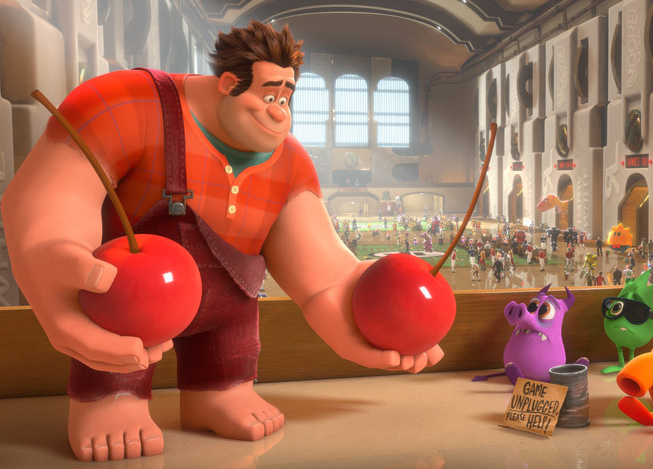Critics love "Wreck-It Ralph."
The new Disney animated adventure has attracted an 84 percent "fresh" rating on the critics aggregator Rotten Tomatoes, trouncing the scores of recent Pixar films like "Brave" and "Cars 2." The film centers on an arcade game villain who tires of being the bad guy and sets off on a quest across various video games to see if he can become a hero. John C. Reilly, Jane Lynch and Sarah Silverman lend their voices to the film, which hits theaters today.
"Wreck-It Ralph" is battling a long legacy of horrific video game movie adaptations, an ignominious list that includes "Street Fighter" and "Super Mario Brothers." But TheWrap's Alonso Duralde says that the film, loaded with inside-jokes for gamers, manages to side-step the critical infamy that greeted that anti-Criterion Collection.
 "Life lessons about being true to yourself are learned along the way, delivered with all the subtlety of Felix’s hammer, but 'Wreck-It Ralph' actually makes us care about these videogame characters and their dreams for a better life," he writes. "Even when the plot twists and character arcs in Phil Johnston ('Cedar Rapids') and Jennifer Lee’s screenplay feel familiar, the voice performances, particularly from Reilly and Silverman, keep things fresh."
"Life lessons about being true to yourself are learned along the way, delivered with all the subtlety of Felix’s hammer, but 'Wreck-It Ralph' actually makes us care about these videogame characters and their dreams for a better life," he writes. "Even when the plot twists and character arcs in Phil Johnston ('Cedar Rapids') and Jennifer Lee’s screenplay feel familiar, the voice performances, particularly from Reilly and Silverman, keep things fresh."
By and large, Duralde's fellow critics agreed. In The New York Times, A.O. Scott hailed the film and its video game-hopping setpieces as triumphs of the production designer's art. It's a film, he says, that could have been crassly commercial and totally fixated on merchandising potential, but instead is a well-executed, cleverly scripted, pixilated pleasure.
Also read: 'Wreck-It Ralph' Review: Arcade-Generation 'Roger Rabbit' Is Worth Every Quarter
"The secret to its success is a genuine enthusiasm for the creative potential of games, a willingness to take them seriously without descending into nerdy pomposity," he writes. "I am delighted to surrender my cynicism, at least until I’ve used up today’s supply of quarters."
The Los Angeles Times' Betsy Sharkey is also among the fans of the film. She praised the 3D film for its innovative premise and for finding the humanity in its video game characters.
"More culturally connected and a tad racier than we usually see in the Disney brand, 'Wreck-It Ralph' does a terrific job of providing enough oomph and aaaahs for adults and plenty of giggles for kids inside its artfully wrapped animation package," she writes. "Whether the presence of Pixar's John Lasseter at the studio's animation helm or the new kids on the filmmaking block are responsible, the film blows in like a fresh 21st century breeze."
Also sitting back and enjoying the game was Time critic Mary Pols, who raved that "Wreck-It Ralph" was the best family film of the year, thanks to its clever jokes and generous heart.
"As a little girl gazes into a screen, with only the audience privy to the lively, far more complex world teeming inside, the message is, And we’re satisfied with this? 'Wreck-It Ralph' celebrates video games, but it also makes a subtle plea for participation in a three-dimensional world," she writes. "At least that’s what I’m going to tell myself when I take my PlayStation-Game Boy-Xbox–deprived kid to see it this weekend."
That's not to say that "Wreck-It Ralph" didn't have its detractors, among them the Boston Globe's Ty Burr and the Wall Street Journal's Joe Morgenstern. Burr said the conceit was a clever one, but complained that the execution was faulty.
"It’s just more of the fodder designed to keep your kids attached to the life support systems of their home entertainment centers," Burr writes. "Cranky old critic says: Send ’em outside to play instead."
Morgenstern also found the plot to be inert, griping that after kicking off promisingly it devolves into a numbing series of chases.
"A further question posed by 'Wreck-It Ralph' is whether brilliant animation alone can sustain a film that comes up short in dramatic development," he writes.
